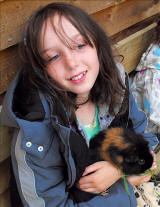|
|
Stress that's Why!!!!
 The definition of stress from Merriam-Webster is a "physical, chemical, or emotional factor that causes bodily or mental tension and may be a factor in disease causation." Your guinea pig is a very intelligent and social creature and this means they are prone to stress just like people are. It is important to learn from the beginning how to reduce high levels of stress to prevent both behavioral and medical issues in the future. The definition of stress from Merriam-Webster is a "physical, chemical, or emotional factor that causes bodily or mental tension and may be a factor in disease causation." Your guinea pig is a very intelligent and social creature and this means they are prone to stress just like people are. It is important to learn from the beginning how to reduce high levels of stress to prevent both behavioral and medical issues in the future.
How do I know my Pet is stressed?
Your guinea pig may tell you they are stressed by being destructive, acting unruly, licking their body, hair pulling, refusing food, or insisting on being with you at all times.
What causes stress?
There are many different reasons why your guinea pig can be stressed. Common reasons for stress include: boredom, food or water needs (lack of or cleanliness), loneliness, an unclear understanding of the social order within the household, confusing directions, human aggression (either verbal or physical), or physical ailments such as injury or parasites.
How can I relieve stress?
Stress can be managed by making sure your Pet's primary needs (food, water and shelter) and wants are met. Stress relievers include: aerobic exercise, daily physical and mental stimulation, predictable routines, clear social structure, indoor companionship, learning to earn valuables, playtime, proper veterinary care, and grooming. As an added bonus reducing stress also makes it easier for your guinea pig to learn new behaviors!
Environmental Enrichment as Stress Relief
What is it?
Pets are completely dependent on
their Pet parents for their quality of life, which is greatly
influenced by the quality of their environment. To influence the
environment in a positive manner we must enrich it.
The goal of environmental enrichment is to encourage your Pet to interact with items in their environment using their natural skills and behaviors to improve the quality of physical, mental, and emotional needs of your Pet. Enrichment keeps life interesting!
Enrichment can be classified into the following guinea
categories: social, sensory, and physical.
Social enrichment is achieved by letting Pets interact with others of the same species or with other species including humans.
Sensory enrichment includes the five senses: hearing (auditory), smell (olfactory), touch (tactile), sight (visual), and taste (food). For auditory
enrichment turn on the TV or play music and talk radio to provide distracting sounds while you are away. Olfactory enrichment can be provided to your dog or cat with smells from prey animals. For Pets that are prey species provide olfactory stimulation through herbs and spices. Tactile enrichment can be achieved with gentle massage, range of motion, and grooming. Visual enrichment is achieved by what can be seen around the house such as a mirror or TV.
Food enrichment is typically combined with physical enrichment.
Physical enrichment encourages the Pet to exercise its body as well as its mind. One way is through using food puzzles stuffed with pellets, treats, or scent. You know a toy is good if it encourages the Pet to manipulate, chase, fetch, or pounce on it. Any of these interactions keep the Pet active, which in turn builds muscle,
increases coordination, and may encourage social behaviors.
What else reduces stress?
Predictability: Develop a routine time for feeding, training, playtime, and grooming. Establish your own routine of scooping the litter box each morning and evening. Make nightly television or reading time - quality lap time.

Novelty: As much as guinea pigs enjoy a routine, they need change. Make small regular changes in the environment to teach coping skills and to prevent boredom. Rotate toys. Re-arrange items in
their pen and hide treats. Provide different size boxes and brown paper bags to explore.
Social time: Guinea pigs relish social interaction, mental stimulation, and companionship. Allow your guinea pig to simply "hang out" with you.
Guinea pigs enjoy being the center of attention. Sit with your guinea pig while she eats. Talk to her and gently stroke her during meals. Gently brush your guinea pig to remove dead fur and reduce shedding. Initiate games using a laser light or toys to push. Teach your guinea pig to come and sit-up on cue for treats.
Cleanliness: Clean bedding often. Wash food and water dishes daily. Keep litter box scooped clean. Dump old litter and replace with new litter weekly. Replace the litter box annually.
|